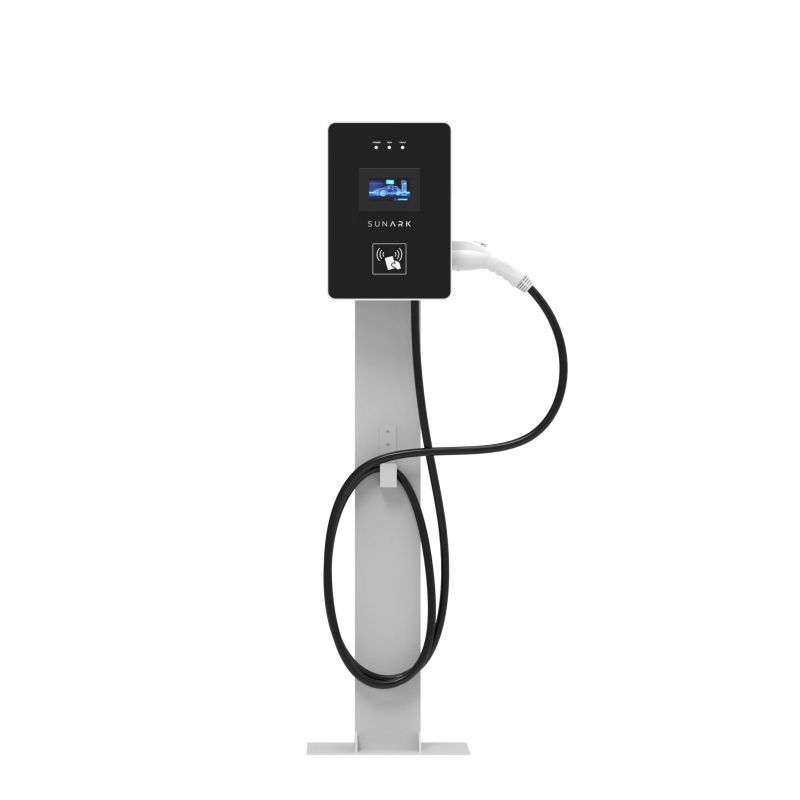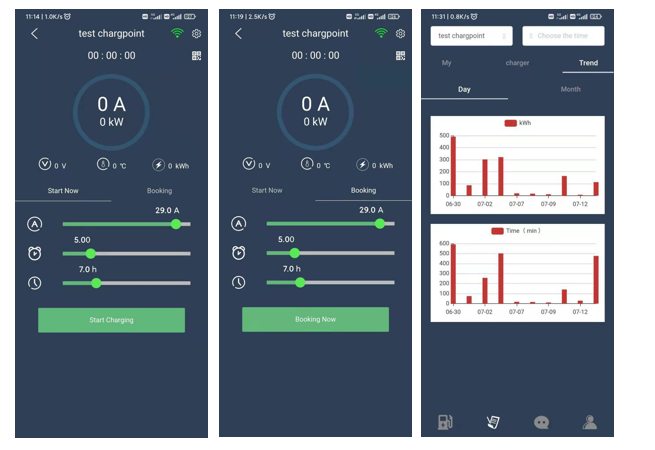AC EV charger, also known as an AC charging station, is a device used for charging electric vehicles (EVs) by converting alternating current (AC) from the power grid into direct current (DC) that can be stored in the vehicle's battery.
The main point of an AC EV charger is to provide a convenient and accessible charging solution for EV owners.
Standard:
SAE Standard / IEC StandardConnector type:
Type 1 / Type 2Connector Mechanical Operating Life:
≥10000 times
Here are some key features and benefits of AC EV chargers:
Power source: AC chargers are connected directly to the electrical grid, meaning they can utilize the existing infrastructure without the need for additional DC fast charging equipment.
Charging speed: AC chargers typically offer slower charging speeds compared to DC fast chargers. However, they are suitable for overnight charging or longer parking durations, such as at home, workplaces, parking lots, or public locations where users are likely to stay for an extended period.
Flexibility: AC chargers can be compatible with a wide range of EVs, as most electric vehicles have onboard chargers that can handle AC power. This makes them versatile and usable by multiple vehicle models.
Cost-effective: AC chargers are generally more affordable to install and operate compared to DC fast chargers. The infrastructure requirements are less complex, making them a cost-effective option for residential and commercial installations.
Home charging: AC chargers are commonly used for home charging, allowing EV owners to conveniently charge their vehicles overnight and wake up to a fully charged battery each morning.
Level 2 charging: AC chargers often provide Level 2 charging, which offers higher charging speeds compared to a standard household outlet (Level 1 charging). Level 2 chargers typically deliver power between 3.3 kW and 22 kW, depending on the capacity of the charger and the vehicle's onboard charger.
Overall, the main point of an AC EV charger is to provide a reliable, accessible, and cost-effective charging solution primarily suited for overnight or long-duration charging needs, such as residential and destination charging.

What is AC EV charger mean?
AC EV chargers, also known as Level 2 chargers, provide several advantages in the charging infrastructure for electric vehicles (EVs). Here are some key advantages of AC EV chargers:
Charging Speed: AC EV chargers offer faster charging speeds compared to standard household outlets. They typically provide power between 3.3 kW to 22 kW, allowing for quicker charging times compared to Level 1 chargers.
Convenience: AC EV chargers are designed to be installed in homes, workplaces, commercial buildings, and public locations. They provide EV owners with the convenience of charging their vehicles at their preferred locations, eliminating the need to rely solely on public fast charging stations.
Cost-effective: AC EV chargers are generally more affordable to install and operate compared to DC fast chargers. They utilize the existing electricity grid infrastructure, reducing the need for expensive upgrades to support higher power levels.
Compatibility: AC EV chargers are compatible with a wide range of electric vehicles. They use the commonly available Type 2 connector, which is widely adopted in Europe and becoming more prevalent in other regions as well.
Flexibility: AC EV chargers offer the flexibility to adjust charging levels based on the vehicle's battery capacity and the available power supply. This makes them suitable for various EV models and adaptable to different charging scenarios.
Load Management: AC chargers can be integrated into smart charging networks, allowing for load management and demand response capabilities. This enables efficient utilization of the available electricity capacity and helps avoid grid overload during peak charging times.
Safety: AC EV chargers incorporate safety features such as ground fault protection, temperature monitoring, and overcurrent protection to ensure the safe and reliable charging of electric vehicles.

How does DC charge station work?
A DC (Direct Current) charger station for electric vehicles (EVs) works by directly converting AC power from the electrical grid into DC power that is compatible with the vehicle's battery. Here's a simplified explanation of how it works:
Power Conversion: The AC power from the electrical grid is received by the charger station and converted into DC power using power electronics, such as rectifiers and inverters.
Voltage Regulation: The DC charger station then regulates the voltage of the DC power to match the requirements of the EV battery. Different EV models may have different voltage requirements, so the charger station adjusts the output accordingly.
Charging Process: The EV plugs into the DC charger station, and a communication protocol between the station and the vehicle is established to ensure compatibility and safety. The charger station delivers the DC power directly to the vehicle's battery through the charging cable.
Rapid Charging: One of the main advantages of a DC charger station is its ability to provide high charging power, allowing for faster charging times compared to AC chargers. DC chargers can supply power at levels up to several hundred kilowatts, enabling quick recharging of EVs, especially for long-distance travel or when the battery is heavily depleted.
Efficiency: DC chargers tend to be more efficient than AC chargers because they eliminate the need for the vehicle's onboard charger to convert AC power to DC power. By providing the compatible DC power directly, less energy is lost in the conversion process, resulting in higher overall efficiency.
Compatibility: DC charger stations support various charging standards, such as CHAdeMO, CCS (Combined Charging System), or Tesla's Supercharger system. These standards ensure interoperability among different EV models and charger station manufacturers, allowing EV owners to use different DC charger stations.

How to use the monitoring APP?
Centralized Monitor System: EV chargers can be connected to a centralized monitoring system that allows operators or administrators to remotely monitor the charging status, energy consumption, and any faults or abnormalities of the chargers.
Mobile Applications: Many EV charger manufacturers provide mobile applications that allow users to monitor and control the charging process.
Website: Some EV charging networks offer web portals where users can log in to monitor their charging sessions, view charging history, and access other relevant information.
RFID or NFC Card: EV chargers can be equipped with RFID (Radio-Frequency Identification) or NFC (Near Field Communication) card readers.
Display Screens: Many EV chargers have built-in display screens that show real-time charging information, such as charging power, charging time
It's worth noting that DC fast chargers, also known as Level 3 chargers, have their own advantages, such as significantly faster charging speeds and compatibility with certain high-capacity EVs. However, AC EV chargers remain a popular and practical charging solution for most EV owners in various settings.
FAQs:
Q1: Do you support OEM/ODM?
A:Definitely, OEM&ODM service is supported with a certain quantity,including customize logo,package and label;
Q2: What's the production time?
A: The production time is normally 15 working days. but we will always prepare some stocks for popular models.
Q3: Can you provide DDP service?
A:Yes, if you are a personal customer and don't want to deal with the customs, we can provide DDP service to your address.
Q4: What about the warranty and how to claim?
A: Warranty period are 5 years since you receive the product, our professional after-sales team will deal with all warranty issues.